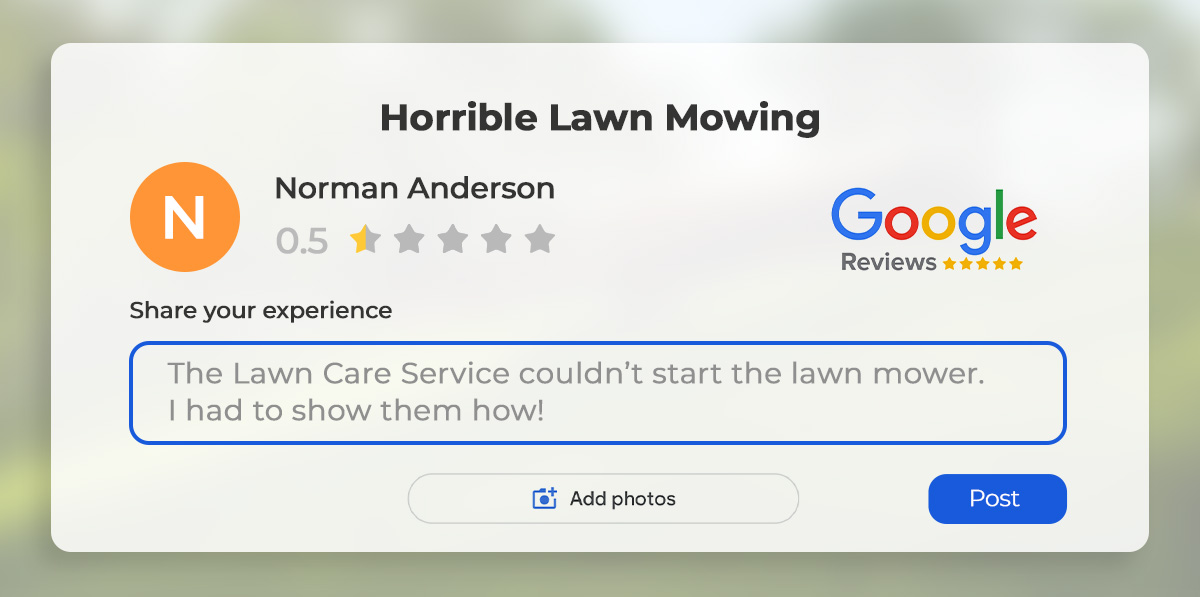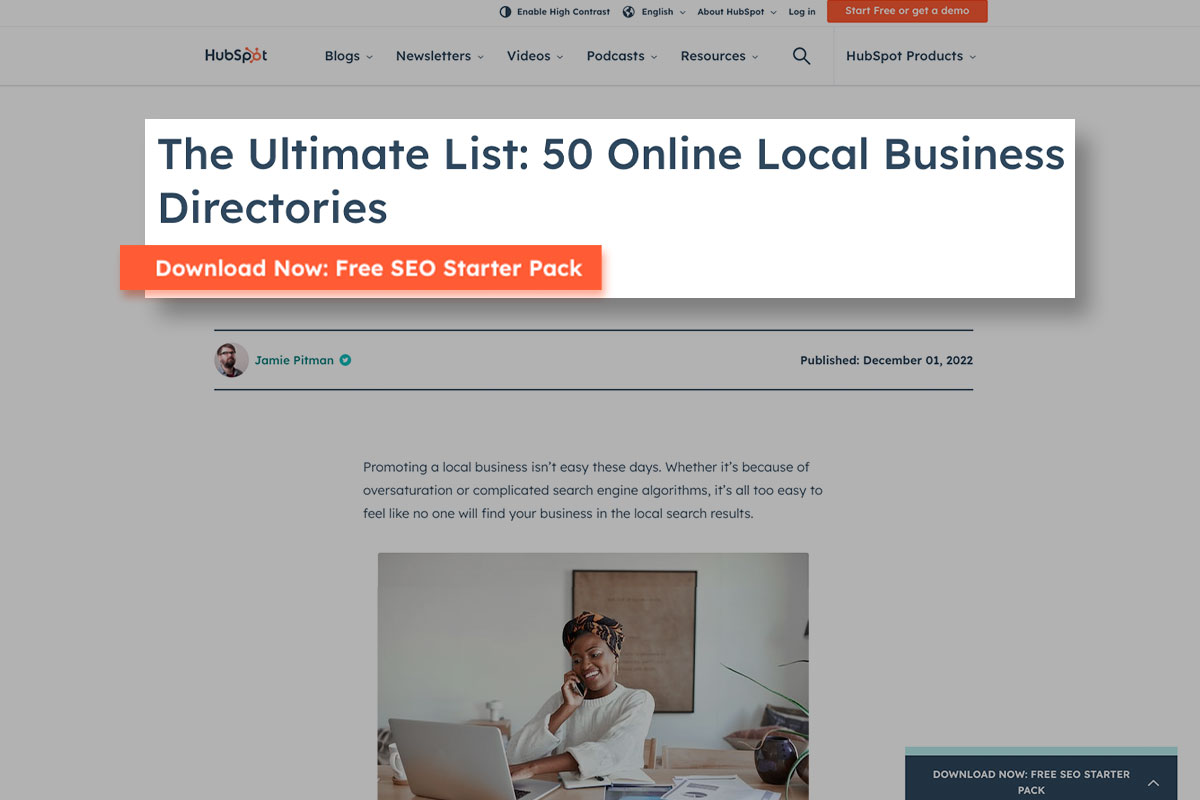Did you know starting a lawn care business could make you over $250K in your first year?
Rob Palmer started Lawn Squad, formerly known as Weed Pro, nearly 25 years ago. His lawn care company made $250K in the first year and now brings in over $10M annually.
We’ll share marketing and business strategies that will help you build a successful lawn service company.
Continue reading or click on any of the links below to jump to that section:
Get ready to learn how to start your own lawn care business.
Case Study: Lawn Squad
When you think about lawn care services, you probably think about lawn mowing, tree trimming, or landscaping. Lawn Squad takes a completely different approach to providing lawn care services.
Besides the basics, they also offer aeration, seeding, and pest control. Their average job is only about $80, but they have more than 14,000 clients to keep them busy.
Rob told us:
He took a unique approach to starting his lawn care company.
In addition, he used another strategy to increase cash flow:
This focus on marketing allowed Rob to quickly scale his business in lawn care services. However, spending a lot on marketing isn’t enough. You also have to provide excellent customer service.
His strategies include:
- Lots of direct mailer marketing supplemented by other strategies
- Over-the-phone quotes that lead to a 50% closing rate
- Testing new equipment to complete jobs even faster
This led to a business model where each job takes about 15 minutes and each van makes between $2,000 and $2,500 per day.
Watch the video below to learn more about how to start a lawn maintenance business:
Next, let’s discuss some of the things a lawn care business owner needs to know before starting your own lawn care business.
Learn About Lawn Care Businesses
It’s helpful to understand the lawn care industry before entering it. Get ready to learn about lawn mowing.
According to IBIS World, lawn care is part of landscaping under NAICs code 56173. The industry makes over $176.5 billion in revenue and $15.4 billion in profit. That’s a profit margin of 8.7%.
Additionally, there are more than 648,000 businesses in the sector that collectively have over one million employees.
How much does it cost to start a lawn care business?
You can start a lawn mowing business for less than $1,000, but the amount you start with impacts how fast you’ll grow. Rob told us:
We also asked him about starting a lawn care business with no money.
Is there money in the lawn care business?
Yes! The average lawn care company makes $232,000 according to our business ideas database. But some of the biggest ones make even more.
Rob’s first location now earns over $5.8 million per year after making $250K during the first year. He’s consistently reinvested in his business to grow from a single truck to 35 trucks; 14,000 clients; and a whole franchise system.

How much do lawn care professionals make?
The median wage for a lawn care professional is around $17.96 per hour, or $37.36K per year, according to the Bureau of Labor Statistics. Business owners typically make an additional $11,310 in profit per employee based on an 8.7% profit margin.
Rob told us:
That means Lawn Squad nets nearly 125 times as much profit as a normal lawn business.
Get a Lawn Squad Franchise
Lawn Squad offers best-in-class training, marketing, and support to help you start a successful lawn care business.
You’ll get a special discount as an UpFlip viewer. Learn more about Lawn Squad.
How to Start a Lawn Care Business
Most lawn care businesses will follow a similar path:
- Write a lawn care business plan.
- Legally register your lawn care business.
- Purchase lawn care equipment.
- Get lawn care business software.
- Start marketing your business.
- Consider hiring employees.
- Provide services and get reviews.
Keep reading to learn more about how to start a lawn service business.
Step #1. Write a Lawn Care Business Plan

You can start a lawn care business from home and make great money, but a lawn care business plan is your road map to long-term success.
Most business plans are pretty standard. Make sure to address:
- Lawn care insurance
- Competing lawn care companies in your area
- Lawn care equipment
- Financial projections
- Service area
- Lawn care business licenses and permits
- Marketing plan
- Strategies to make money
The best part is that UpFlip’s guide steers you through writing a business plan. It also includes a free template to download.
It’s worth your time to check it out. We even discussed business plans with Mike Andes, the founder of Augusta Lawn Care.
While writing your business plan, you’ll need to do lots of research on how to start lawn care business operations.
Perform Market Research
You can’t talk about how to start a lawn care business without identifying your ideal customers and creating a customer persona.
Lawn care services have a fairly obvious target market:
- Homeowners and commercial clients
- People who make over $100,000 per year
- People who live within a specific radius (normally 5-10 miles for best results)
Rob explained:
You can use the Census Bureau’s website to narrow down what areas can afford standard and specialized services.
What type of lawn care business is right for you?

Lawn care business owners have different options in terms of what services to provide. You might want to consider some of these services as part of your core business:
- Landscape care and maintenance
- Lawn mowing
- Tree trimming
- Weed pulling
- Arborist services
- Fertilizing lawns
- Landscape installation
- Planting trees and shrubs
- Spraying lawns
- Landscape design
- Turf installation
Pro Tip: Given that landscaping services are often seasonal, you may want to consider other services that can keep your employees busy during the colder months. Many service companies offer holiday decorating services to stay busy over the winter.
Invoice Owl has a great blog about these lawn care services and more.

Funding
As a new business owner, you’ll need to cover your startup costs. Fortunately, landscaping businesses have a low barrier to entry.
The average lawn care company has $7,000 in startup costs, but starting a lawn service company with less than $1,000 is possible. Other landscaping businesses have started small businesses with:
- Credit cards
- Angel investors
- Crowdfunding
- Business partner(s)
- Grants for starting a lawn care business (yes, there are some!)
- Home equity loans
- Gifts from friends or family
- Personal finances through savings or wages
- Rollover for business startups (ROBS)
Try obtaining business financing through one of our partners.
Create a Lawn Care Pricing Chart
How much does a lawn service charge? You’ll want to take some time to research it.
We’ve done some preliminary research for you. Lawn care professionals can charge based on a variety of factors. Here are the typical rates:
• Lawn mowing price per hour: $25 to $65
• Lawn mowing price per square foot: $0.01 to $0.05
• Average lawn mowing price per job: $123
Jobber lists the costs for various lawn care services. Some specialty services can run into the thousands.
Here’s a basic set of prices to help you establish a price range:
| Type of Service | Price Per Job (Average) |
| Aerating | $139 |
| Cleaning yard | $400 |
| Winterizing yard | $393 |
| Weeding | $95 |
| Fertilizing | $224 |
| Removing leaves | $370 |
| Seeding | $1,100 |
Create a basic lawn care price sheet after you’ve decided how much to charge. You’ll also need to decide whether to charge by area or by the hour. For example, you could charge up to $98 per hour for mulching or $45 per cubic yard.
Step #2. Legally Register Your Lawn Care Business

You’ll need to form a legal entity before taking lawn care customers or starting lawn care operations. This profitable business model has safety concerns that mean the business needs to be formed properly even if it’s part time. You’ll want to:
- Choose a business name.
- Create the business structure.
- Get a lawn care business license.
- Open a business bank account.
- Get business insurance.
Consider Lawn Care Names
Choosing a business name is an exciting part of starting a lawn care business. Enjoy being creative, but consider the following points:
- Use the words lawn care: You want people to know what you do. Augusta Lawn Care has it right in the name.
- Keep it clear and simple: Potential customers may be put off by a name they struggle to spell or pronounce.
- Include a location: Consider including your location to attract customers in your area and establish yourself within the local region.
Mike Andes, the founder of Augusta Lawn Care, explained how important branding is to a business name. Augusta Lawn Care is named after the golf tournament because he wants to allude to the high-quality greens where the tournament occurs.
He warned about being too particular about your inspiration. He once used white uniforms like the golf caddies, and that was a big mistake. Check out our interview about branding below:
Make Sure the Business Name Is Available
Run your name through our business name generator, then click on the name to buy it directly from NameCheap. While you’re doing that, check out our guide on creating a website.
Choose a Business Structure

There are several types of business structures you may want to use. You can file for most of them on the secretary of state’s website for your area.
- S-Corporation: This type of business is best for high-earning companies that want to lower taxes for the business owner. It has a limited number of stockholders and provides personal liability protection. It also requires business owners to receive a salary (and optional dividends), so there’s no double taxation.
- C-Corporation: This is the best option for ambitious companies that are trying to change the world. It has unlimited stockholders and provides personal liability protection, but you’ll also need to contend with high compliance costs and double taxation. Owners can earn money through multiple income streams with different tax codes.
- Limited liability company (LLC): An LLC is best if you want to separate your business from your personal assets. A limited liability company offers pass-through income without double taxation.
- Sole proprietorship: This model is the best when you’re just getting started. It doesn’t provide liability protection or create a separate business entity. Your profit will be considered personal income. However, you shouldn’t create a sole proprietorship if you intend to hire employees.
To learn more about business formats, check out our blog on 11 business structures.
Get a Lawn Care Business License
You’ll also want to get your business licensed. Some states let you do it all at once.
What licenses are needed to start a landscaping business? You’ll need to check the requirements for your specific location to find out.
Additionally, make sure to grab an employer identification number from the IRS. It’s like a social security number for your business.
Open a Business Bank Account
Every lawn care business needs to open a business bank account to separate your business and personal finances. Business bank accounts can either be online or through physical banks and credit unions.
Online banks tend to have better offers, but they might not have the full range of business credit card accounts you can open in a traditional bank. If credit accounts or making cash deposits are important to you, go with the legacy banks.
Lawn Care Professionals Need Business Insurance

You’ll want to get lawn care business insurance that includes:
- General liability insurance
- Property damage insurance
- Workers’ compensation insurance
- Cybersecurity insurance (due to storing customer data)
Consider Simply Business to get the most competitive business insurance quotes.
Step #3. Purchase Lawn Care Equipment
The right lawn care equipment will vary based on the services you offer. Most businesses will need:
- Work vehicle: Buying a used lawn care company vehicle will often be more cost effective than buying new.
- Trailer: Make sure you have a truck or trailer that’s large enough to carry all your equipment.
- Lawn mower: You can choose either a riding lawn mower or a push mower. A riding mower is easier to operate, but a push lawn mower is less expensive.
- Blower: You’ll need something for blowing leaves.
- Trash bags: These are to collect debris if you use a push mower.
- Trimming equipment: You’ll need trimmers for bushes and shrubs.
- Weed eaters: Weed eaters and edgers are helpful for those hard-to-cut areas around fences and curbs.
- Specialty equipment: Depending on the services you offer, you may need other equipment. As a seasonal business, you might also supplement your income by performing jobs like snow removal that require other tools.
Rob uses a unique lawn care set up. He spent some time explaining the concept and how he came to it:
For those of you who have never mowed lawns, please learn how to start a lawn mower before taking on jobs. It would be really embarrassing to show up at a job and get a review like the one below:

In addition to the tools to do the job, you’ll also need software to run your business.
Step #4. Get Lawn Care Business Software
You’ll need some software to manage potential and existing customers for your lawn care business. You might want to check into some of the following providers:
- HubSpot: Rob uses HubSpot for his customer management software.
- Service Autopilot: This customer relationship management software is specifically for lawn care businesses.
- Clearent: You’ll need a payment processor, and since Clearent is built by the same company as Service Autopilot, they’ll work together seamlessly.
- Quickbooks: You’ll want accounting software as well. Most business owners go with Quickbooks because almost every software company integrates with them.
Rob explained one of the innovative ways he provides customer service is his one-touch booking system:
This helps him get nearly 50% conversions on the first contact. That’s amazing!
If they don’t get the customer to sign up during the initial contact, they enter the customer into an email automation sequence that educates people on the benefits of fertilizing and using weed killers.
Step #5. Start Marketing Your Business

One of the challenges many people face while learning how to start a lawn care business is successfully marketing their new business. When Rob started Lawn Squad almost 25 years ago, he went all in on marketing.
As we discussed earlier, he took out a $50K loan against his mortgage and spent it all on marketing. Rob explained what works and what doesn’t:
The rest of his marketing budget is spent on digital, yard signs, and other strategies.
Direct Mailers
Consider creating mailers, brochures, car magnets, flyers, T-shirts, and other promotional swag as a way of getting your name out there. Use an application like Canva to help.
Rob explained how direct mailers are both his best performer and biggest mistake:
He still stands by the value of direct mailing and spends 50% of his marketing in that category.
Several business owners we’ve talked to suggest leaving one on neighbors’ doorknobs while you’re working on a client’s property. You can also mail them an offer to do their lawn next time you’re in the neighborhood.
Create a Lawn Care Website

We already mentioned creating a website, but make sure to implement search engine optimization to get better results. At UpFlip, we use SurferSEO and Ahrefs. You can also perform a quick test to check how your website is performing.
Rob told us how he approaches SEO:
Use Social Media
Instead of spending time scrolling through social media, make it work for your business! Create social media accounts and share your lawn care service prices, useful information, and tips about how to care for lawns.
Facebook and Instagram provide free insights for business accounts. Plus, you can create paid ads.
Use Paid Ads
Rob told us that paid ads on Google and social media platforms are extremely successful in the short term. Small business owners should definitely use them.
Remember that these leads bring them into a funnel with over 50% conversion rates.
Register with Local Business Directories

When you’re wondering how to start a mowing business, you might not think about the sites you can register to get reputable backlinks and referrals to your business. You’ll want to list your services on:
- Google Business Profile
- Thumbtack
- NextDoor
Check out HubSpot’s list of over 50 business directories.
Get Lawn Care Business Cards
One of the easiest ways to market your lawn care business is to give a couple business cards to clients to pass out to their friends. Check out our blog about the best low-cost business cards.
Step #6. Consider Hiring Employees

Many lawn care entrepreneurs hire lawn care employees to grow their lawn care company. Hiring is such a huge subject that I suggest checking out our blog about how to hire employees.
The Occupational Safety and Health Administration (OSHA) offers several safety resources for lawn care business owners. These guides can help you stay safe while running your lawn care service.
At this point, you know how to start a lawn mowing business, but if you want really amazing results, then you’ll need to pay attention to the next step.
Step #7. Provide Services and Get Reviews
You’ll want to provide excellent customer service. Rob told us:
Don’t forget to ask for reviews, They’re a cost-effective way to appeal to customers online. Many companies like Housecall Pro automate asking for reviews to make it easy for customers to let the public know they loved your service.
In addition to providing great customer service, lawn businesses should establish good processes that scale easily and others can follow. You’ll need them to expand your successful lawn care business.
When you’re ready, use Lucidchart to document a process map.
Here are the basic steps for documenting a process:
- Decide what process to map.
- Document who performs each task.
- List all the steps.
- Identify where you can save time.
- Determine the triggers, inputs, and outputs.
- Create the main path, then map out alternative flows.
- Implement the process.
Lawn Care Services FAQ
How to start a lawn mowing business

Starting a mowing business is similar to starting a lawn care service except that it specifically focuses on mowing lawns. To start a lawn mower business, you’ll want to:
- Establish your business.
- Choose your mowing services and prices.
- Get lawn mowing insurance.
- Get a lawn mower and other equipment.
- Market your business.
- Serve customers.
Should I offer health insurance?
Yes. Regardless of whether you are required by law, you want to take care of yourself, your family, and your employees should anyone have health problems.
You’re not required to offer health insurance as a small business owner unless you have more than 50 full-time or full-time equivalent employees. For the purposes of insurance, 30 hours is considered full time.
You can calculate your full-time equivalent employees with this formula:
Total hours worked by all employees / Full-time hours in a year
Just because you don’t have to provide insurance doesn’t mean you shouldn’t.
How much does it cost to start a landscaping business?

The average landscaping company costs $7,000 to start. This figure includes:
- Business licenses
- Insurance
- Landscaping equipment
- Marketing
Do I need a license for my lawn care business?
Yes, most lawn care businesses will need some type of license. Check with your state and local government offices to establish the requirements for your area.
Are you ready to start your own lawn care business?

You now know the answers to questions like:
- How do I start lawn care business operations?
- How much does lawn care cost?
- Do I need a business license for a lawn care business?
Best of all, you’ve got insights from someone who knows how to do it and owns one of the fastest-growing businesses in the U.S.
What else can we do to help you succeed at your goal to start a successful lawn care company? Let us know in the comments below!






